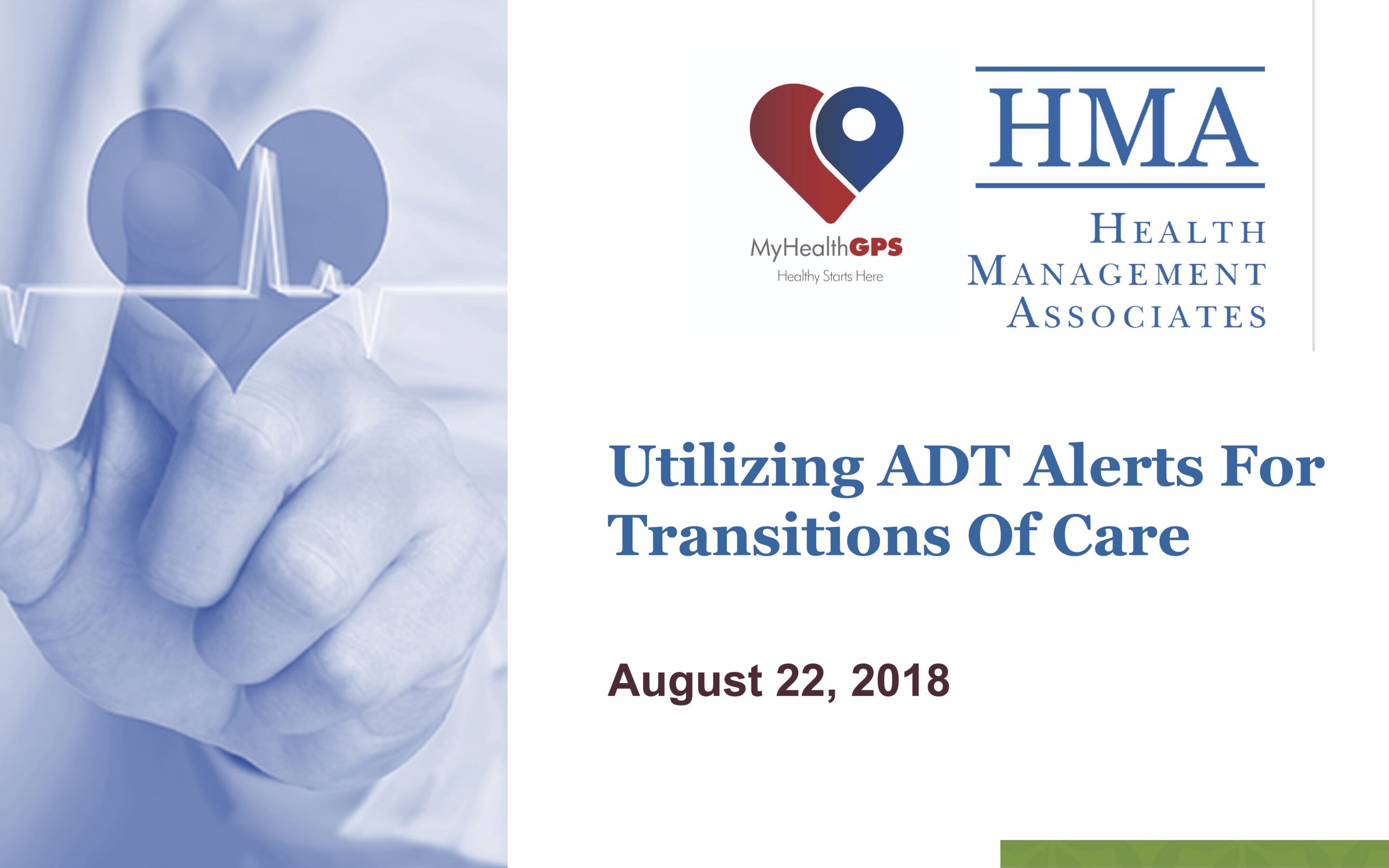Evidence Based Practices Workshop 1 Cognitive Behavioral Therapy

Viewing Time 1 Hour
Adapting Evidence Based Practices for Integrated Care
This webinar workshop series focuses on key elements of evidence-based practices/treatments to assist providers with achieving successful implementation and outcomes. HMA presenters discuss key components of EBPs including but not limited to training, indicated populations, fidelity assessments, tools, and other relevant topics. This webinar includes an interview with psychologist Jennifer Frey who discusses the ways in which she uses and adapts the EBP of Motivational Interviewing in her work as a behavioral health consultant at Unity. Following this webinar, there is a series of three EBP workshops that includes cognitive behavior therapy, behavioral interventions for stress management trauma-informed care, problem-solving therapy.Integrated Care DC Provider Information Session
Integrated whole-person care has been shown to improve outcomes and increase Medicaid beneficiary satisfaction. We want to support you to enhance your practice’s capability to deliver person-centered care, use population health analytics, and engage leadership to support value-based care. Join us to learn more about provider engagement opportunities for year 2 of the Integrated Care DC Program.TeleHealth Workflow Comparison
Pregnancy and Substance Abuse: A Harm Reduction Toolkit
This toolkit was designed to help community providers care for pregnant and parenting people who use drugs in a holistic manner. The kit includes information about stigma reduction, trauma-informed care, and legal services. While the guide was developed IN NY, there are engagement and other information that is useful regardless of location.Telehealth in a Post-Pandemic Era: Sustainable Approaches to Support Integrated Care – Test

Viewing Time 1 Hour
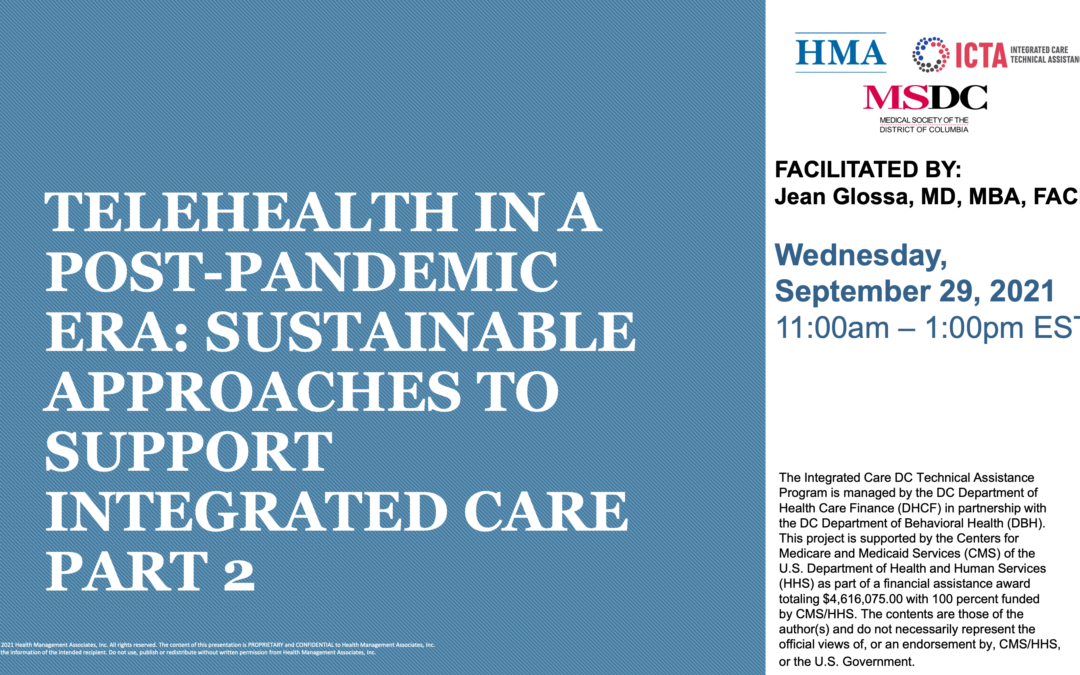
Telehealth in a Post-Pandemic Era Sustainable Approaches to Support Integrated Care – Part 2
This interactive virtual workshop is part two of a two-part series to support providers ongoing efforts to implement and sustain innovative models of telehealth following the COVID-19 public health emergency. Topics include best practices to support behavioral health care delivery through telehealth; improving patient engagement through telehealth and DC telehealth policy and priority updates.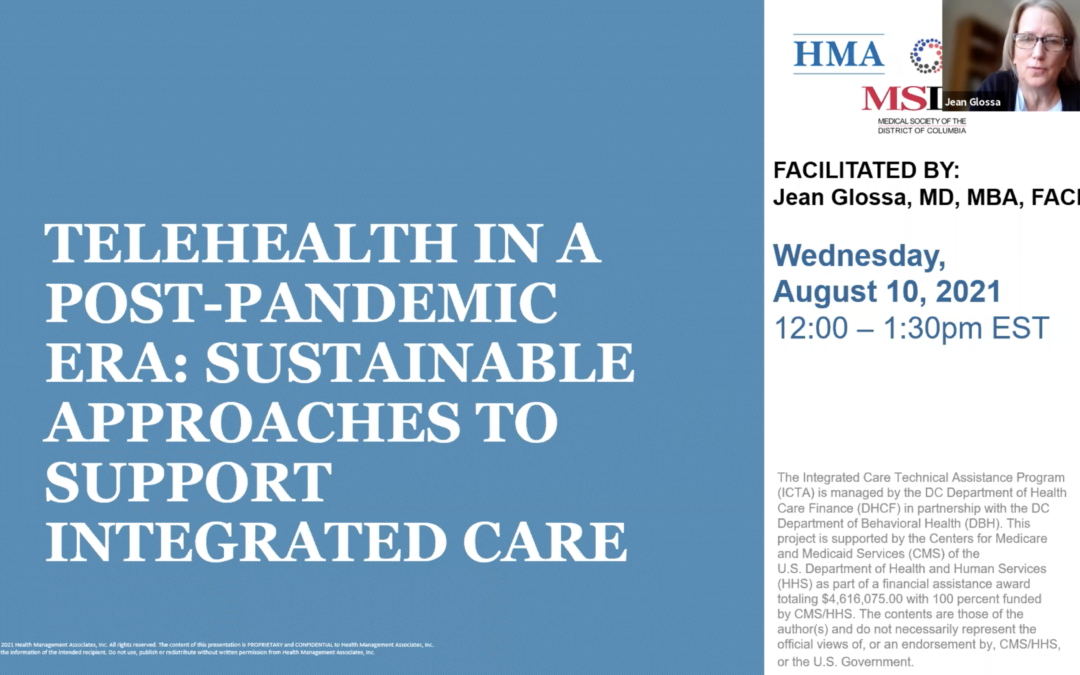
Telehealth in a Post-Pandemic Era: Sustainable Approaches to Support Integrated Care – Part 1
https://www.integratedcaredc.com/wp-content/uploads/2021/08/Webinar-Telehealth-in-a-Post-Pandemic-Era-Sustainable-Approaches-to-Support-Integrated-Care.mp4 Webinar This interactive virtual workshop is part one of a two-part series to support providers ongoing efforts...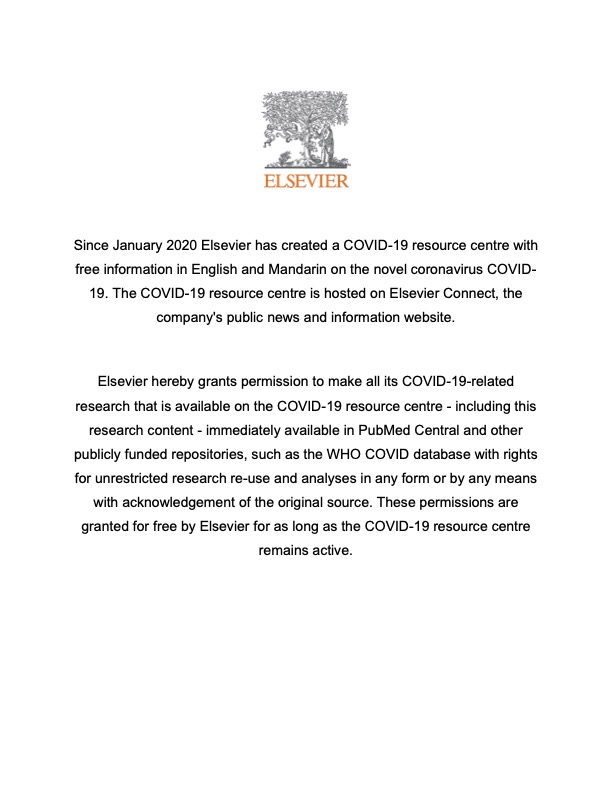
Implementing Telemedicine in Primary Care: Learning Lessons From Electronic Health Records
The common narrative is coronavirus disease 2019 happened, payment and policy barriers were quickly lowered, and voila, telemedicine, a technology for which adoption had been slow over the past decade, is, within a matter of months, in widespread and successful use. Fait accompli. On to this narrative has been grafted the hopes that telemedicine will solve other persistent problems, particularly in primary care.Words Matter: Terms to Use and Avoid When Talking About Addiction
This handout offers background information and tips for providers to keep in mind while using person-first language, as well as terms to avoid to reduce stigma and negative bias when discussing addiction. Although some language that may be considered stigmatizing is commonly used within social communities of people who struggle with substance use disorder (SUD), clinicians can show leadership in how language can destigmatize the disease of addiction.Promoting Culturally & Linguistically Effective Screening Techniques
This module discusses the importance of employing culturally and linguistically effective strategies when r conducting screening and assessments.Why Taking Vitals is so Important
This is a brief video explaining the importance of taking vital signs within a behavioral health setting.Addressing Burnout and Resilience
Burnout is common in healthcare and has increased during the Covid 19 pandemic. This brief presentation defines burnout and it's consequences. Building resilience is a strategy to reduce and prevent burnout. The presentation defines resilience and provides tips in increase personal resilience and organizational resilience.Adolescent Screening for Substance Use Disorders
Adolescents are at the highest risk for experiencing health problems related to substance use. This resource provides an overview of screening adolescents for substance use disorders including assessments and tips.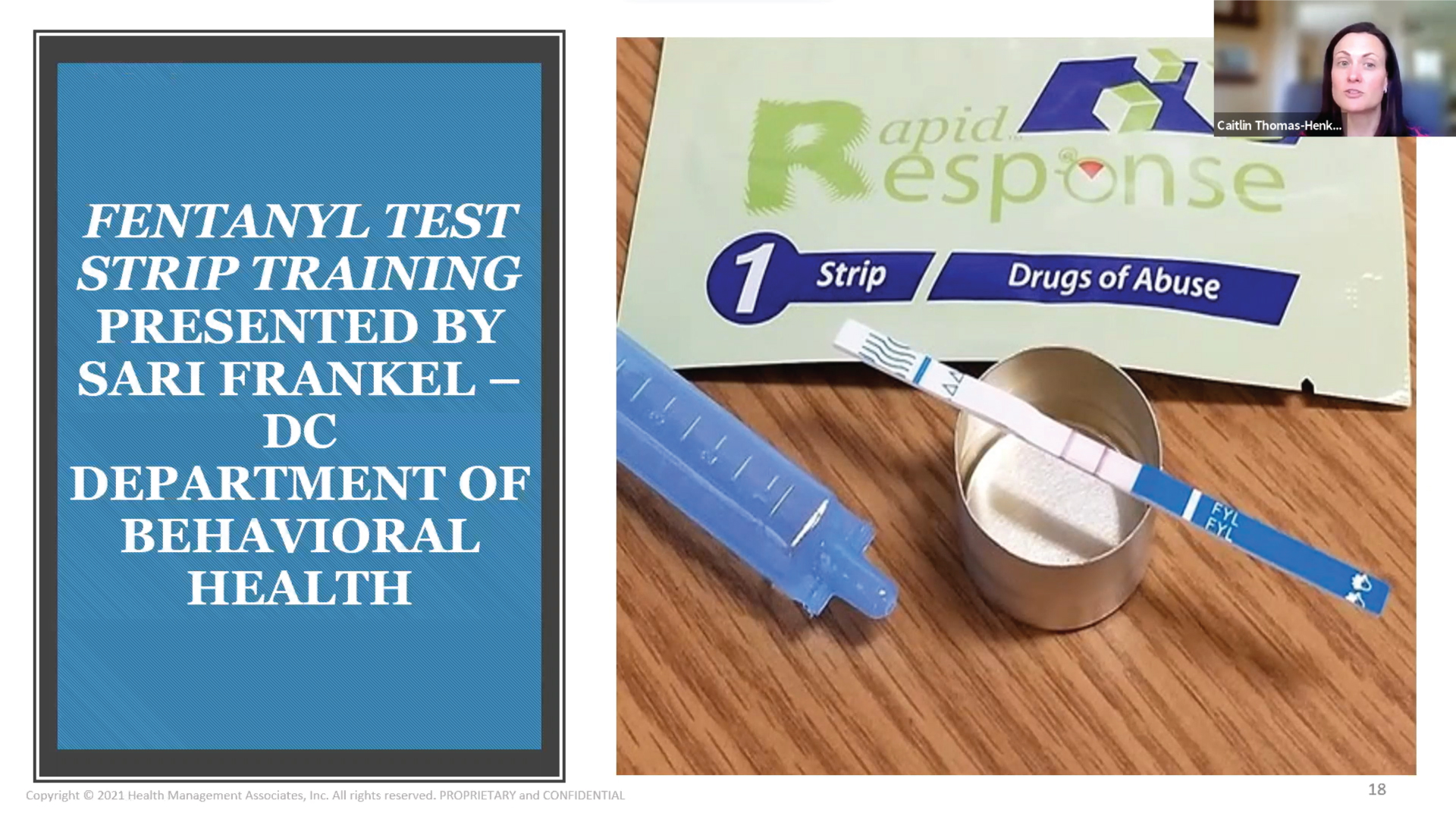
Fentanyl Strip Testing
This brief video provides an overview of fentanyl strip testing to identify the presence of fentanyl in unregulated drugs for people who use drugs (PWUD). It also includes a brief demo of how to use fentanyl test strip testing to detect the presence of fentanyl in their drug supply. Testing for fentanyl test strips can identify the presence of fentanyl in unregulated drugs. They can be used to test injectable drugs, powders, and pills. Being aware if fentanyl is present allows people to implement appropriate harm reduction strategies to reduce the risk of an overdose. Presented by Sari Frankel, DC Department of Behavioral Health.Addiction Free California
The California Department of Health Care Services (DHCS) has implemented the California Medications for Addiction Treatment (MAT) Expansion Project to address the opioid epidemic throughout the state. This website serves as a separate yet complementary resource to the DHCS MAT Expansion Website and provides resources and information related to the four MAT Expansion Project initiatives operated by Health Management Associates. The California MAT Expansion Project aims to increase access to MAT, reduce unmet treatment need, and reduce opioid overdose-related deaths through the provision of prevention, treatment, and recovery activities. The project focuses on individuals experiencing homelessness, youth, rural, and tribal populations with limited MAT access. The California MAT Expansion Project, composed of nearly 30 initiatives, is funded by grants from the Substance Abuse and Mental Health Services Administration (SAMHSA).Effective Strategies to Enhance Transitions of Care for Justice Involved Populations
This webinar focuses on effective strategies for engaging justice-involved populations and ways to support individuals transitioning to communities. The speakers shared case studies to illustrate the ways that providers have managed transitions of care and supported people. This session is approved by the American Academy of Family Physicians for up to 1 AMA Level 1 CME credit.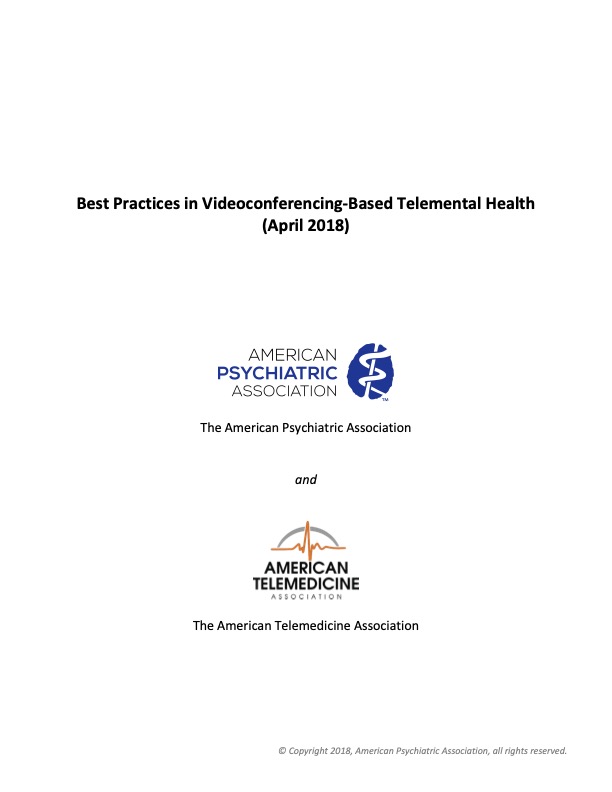
Best Practices in Videoconferencing-Based Telemental Health
This document represents a collaboration between the American Psychiatric Association (APA) and the American Telemedicine Association (ATA) to create a consolidated update of the previous APA and ATA official documents and resources in telemental health to provide a...Peers Speak Out: Priority Outcomes for Substance Use Treatment & Services
The research presented by these three groups seeks to prioritize desired treatment outcomes as defined by diverse people with lived experience. From this information, the researchers crafted recommendations that could help policymakers, providers and researchers develop, implement, reimburse and evaluate more engaging and perhaps effective substance use services.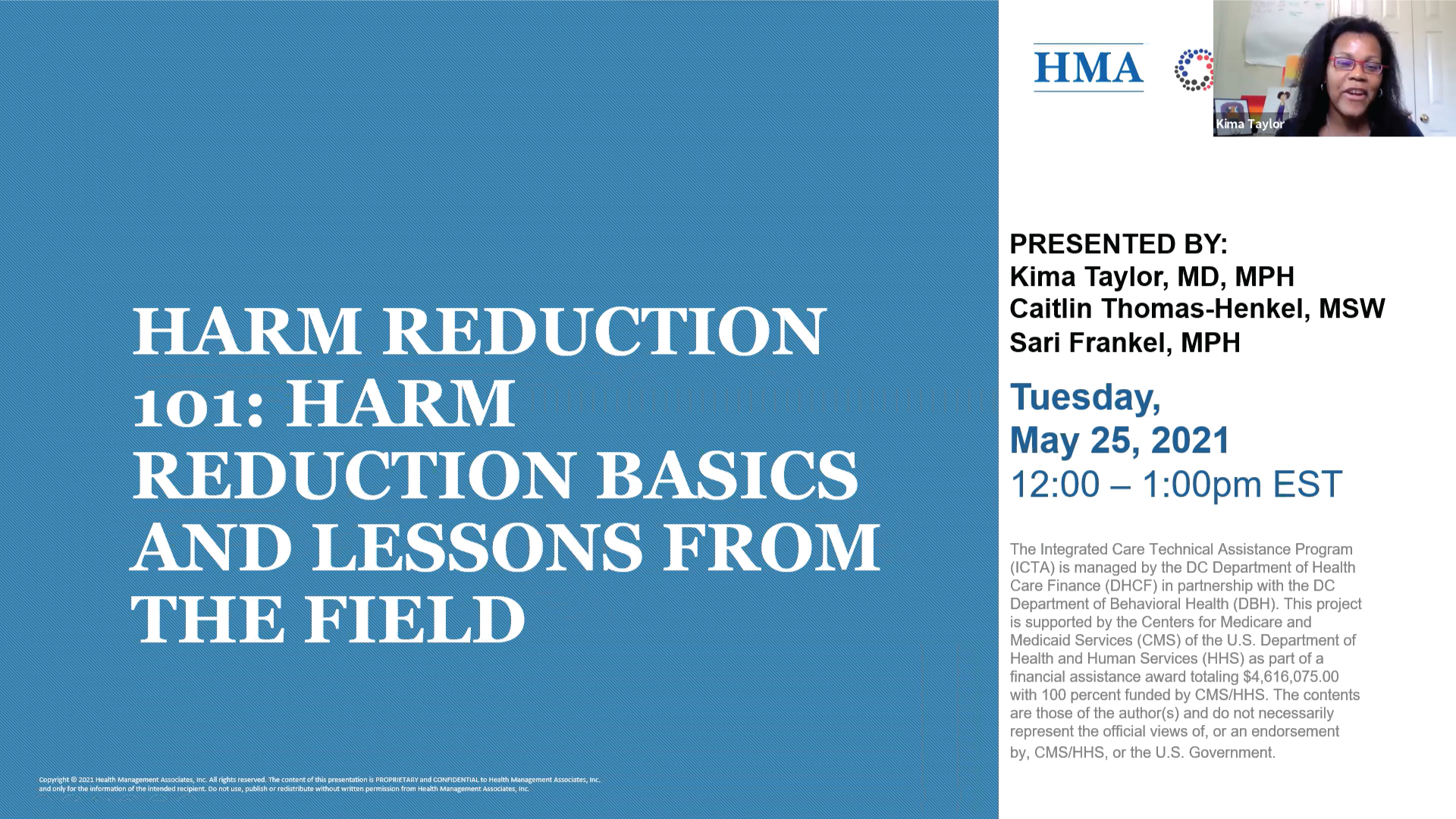
Harm Reduction 101: Harm Reduction Basics and Lessons From the Field
People with substance use disorders are at particular risk for overdoses and developing one or more primary conditions or chronic diseases. During this webinar, presenters will discuss harm reduction as a public health approach that aims to reduce harms related to substance use. Presenters will discuss strategies, policies, programs, and practices that aim to minimize negative health, social and legal impacts associated with drug use, drug policies, and drug laws.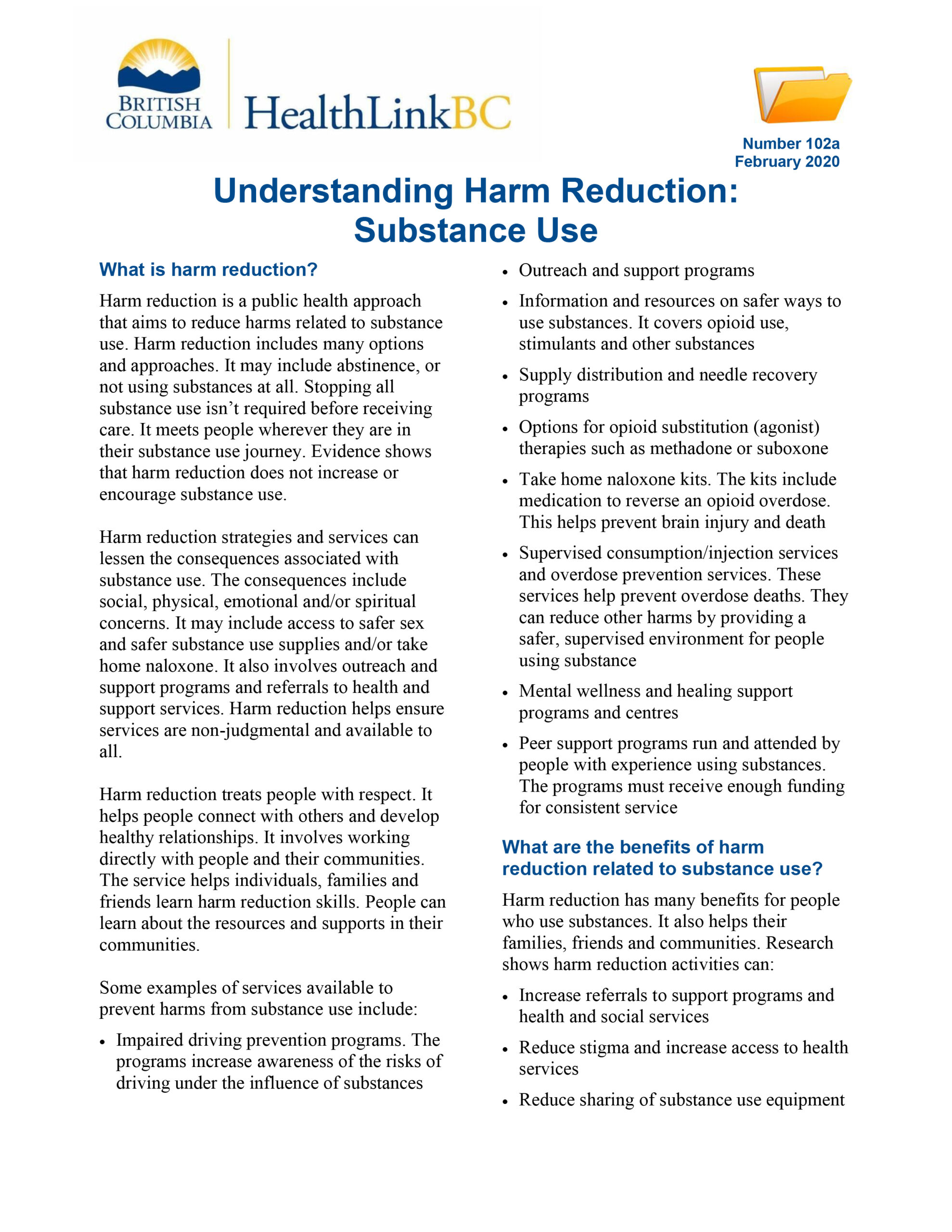
Understanding Harm Reduction: Substance Use
A documented overview of harm reduction, including definitions, benefits related to substance use, and frequently asked questions.Opioid Overdose Prevention ToolKit
This toolkit provides safety advice for patients and family members to help prevent overdose and how to safely use naloxone.Screening for Drug Use in General Medical Settings Quick Reference Guide
This guide is designed to assist clinicians serving adult patients in screening for drug use.Screening for Drug Use in General Medical Settings Resource Guide
Screening and brief intervention provides an opportunity for clinicians to intervene early and potentially enhance medical care by increasing awareness of the likely impact of substance use on a patient’s overall health.Common Questions & Concerns About MAT: A Handout for Family Members of a Person with OUD
This question and answer document answers common questions and concerns that family members have about Medication Assisted Treatment (MAT). The purpose of this document is to assist providers in educating family members.The Next Stage of Buprenorphine Care for Opioid Use Disorder
This article reviews research findings in the following 7 areas: location of buprenorphine induction, combining buprenorphine with a benzodiazepine, relapse during buprenorphine treatment, requirements for counseling, uses of drug testing, use of other substances during buprenorphine treatment, and duration of buprenorphine treatment.COVID-19 Public Health Emergency Response & 42 CFR Part 2 Guidance
The Substance Abuse and Mental Health Services Administration provides guidance for substance use disorder treatment services during the COVID-19 pandemic. The document specifies when a medical emergency exists, 42 C.F.R Part 2 does not apply and any disclosure of medical information is temporarily exempt for purposes of medical treatment.FAQs for OUD Prescribing and Dispensing in COVID 19 Emergency
The frequently asked questions document discusses how providers can provide Opioid Treatment to existing and new patients, and dispense medications via Telehealth while still meeting the 42 C.F.R. 8.11 requirements.COVID-19 FAQ for Mental Health Rehabilitation Centers (MHRCs) and Psychiatric Health Facilities (PHFs)
The frequently asked question document makes recommendations on how to care for patients during the COVID-19 pandemic in Mental Health Rehabilitation Centers and Psychiatric Health facilities. The recommendations suggest how to provide Telehealth services, and how to provide medical care for positive COVID-19 patients.COVID-19 FAQ for Behavioral Health
This document is a resource for behavioral health facilities to better understand how to treat patients and refer patients for medical care during the COVID-19 pandemic.Providing Culturally Sensitive, Patient Centered Care
During the webinar, the presenter will focus on ways to address health equity issues and key considerations for providing linguistically effective services. The presenter will discuss best practices and models to support patients in these challenging times.Understanding the Brain and Treatment for People with Opioid Use Disorders
Understanding the brain chemistry associated with opioid use disorder treatment is essential: Medications for Addiction Treatment (MAT) restores depleted dopamine in the brain so people impacted by OUD can regain functioning. Recognizing this, therapy and support services for OUD are most effective when provided in accordance with a person's healing process and readiness to engage in treatment.Substance Use Disorders: Screening and Assessment
The American Society of Addiction Medicine (ASAM) has established specific criteria for patient assessments and level of care determinations pertaining to substance use disorder (SUD) – providing the underpinnings for effective treatment and recovery from addiction. This webinar will provide attendees with practical tools and tips for implementation of Screening Brief Intervention and Treatment (SBIRT) including assessments, workflows, and reimbursement.Stigma, Myth Busters & Engagement Strategies
This webinar will describe how stigma impacts perceptions and resultant SUD care for patients and providers alike. Presenters will also share key concepts and case studies to illustrate ways to address stigma and tools that can be incorporated into their clinical practice.Integrated Physical and Behavioral Healthcare 102
This webinar will focus on the benefits and outcomes of behavioral health integration and key implementation considerations. The presenters will discuss outcomes that include improving population health, patient experience and reduced costs. The webinar will also feature key integration tips such as building internal support, warm handoffs, establishing workflows among other topics.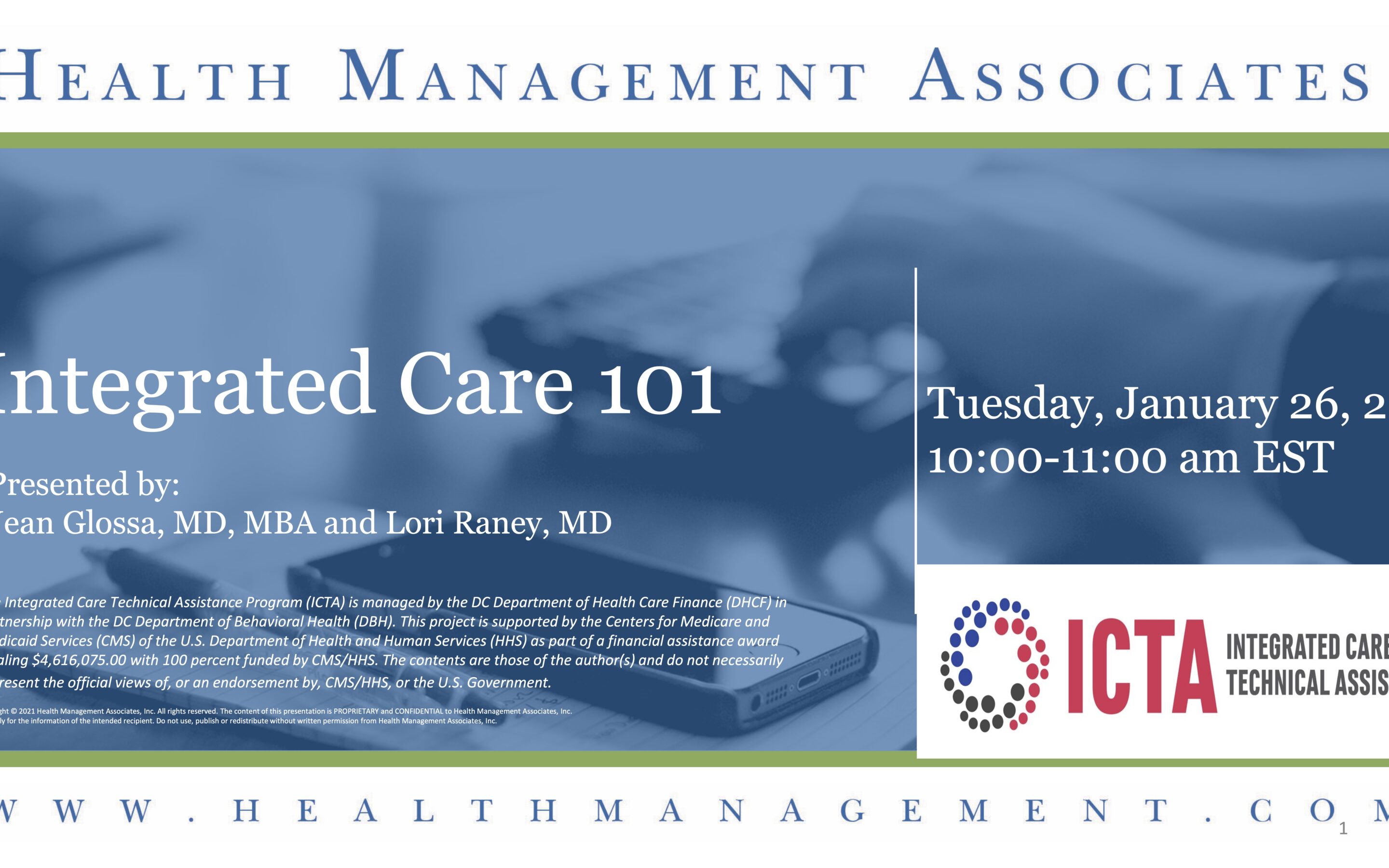
Integrating Physical and Behavioral Healthcare 101
This webinar will focus on the foundational concepts of health care integration – including physical and behavioral health – will be reviewed and discussed. The presenters will also focus on integrating substance use disorders and reverse integration.Addiction Neuroscience 101
This module offers a 25-minute video of the neuroscience of addiction as a chronic brain disease presented by HMA’s Corey Waller, MD, MS, FACEP, DFASAM, with emphasis on Opioid Use Disorder (OUD). "This lecture was developed for audiences of all backgrounds to absorb. From patients to nonspecialist docs. The intent was to move people past the preconceived notion that addiction is a moral failing or choice, to the reality that it is a chronic brain disease that creates maladaptive connections in large swaths of the brain. Over the hundreds of lectures, I have given in my career, I have come to realize that running through 30+ articles in a 70 slide PPT does not move people emotionally. But a good story will. The lecture has coalesced into a story form that is much more compelling than digging through the dense science of voxel dysmorphology, BOLD fMRI technology, and all of the structures postulated to drive craving. If I need a custody officer to "get it" or an administrator to understand the concept, I cannot give them the same lecture I would give a psychiatrist, addiction psychologist, addiction doc, or a neurologist."Provider Information Session
"The systemic approach to providing person-centered care for a defined population that coordinates physical and behavioral healthcare through a team of primary care and behavioral health practitioners, working with the individuals served, families, and other natural and informal supports. Integrated care models ensure that mental health, substance use disorder, primary care, and specialty services are coordinated and delivered in a manner that is most effective to care for individuals with multiple health care needs and produces the best outcomes."Treating Addiction in the Setting of COVID-19
Deeper dive on the operational practicalities of delivering MAT and other SUD treatment to clients through telehealth and other remote means; risk and management of relapse and overdose; current expectations regarding privacy rules, documentation, and new regulations from the DEA.Telehealth Implementation Basics & Payment Updates for COVID-19
The webinar presents policy and reimbursement implications for changes regarding Medicare and Medicaid and the impacts on key provider decisions concerning selecting, implementing, and building a business case for new telehealth services to support patients in these challenging times.How to Screen and Assess People for Substance Use Disorder
This webinar focused on the appropriate screening and assessments for substance use disorders, including the difference between screening and assessment, brief interventions for substance-related issues, and medications for opioid use disorder.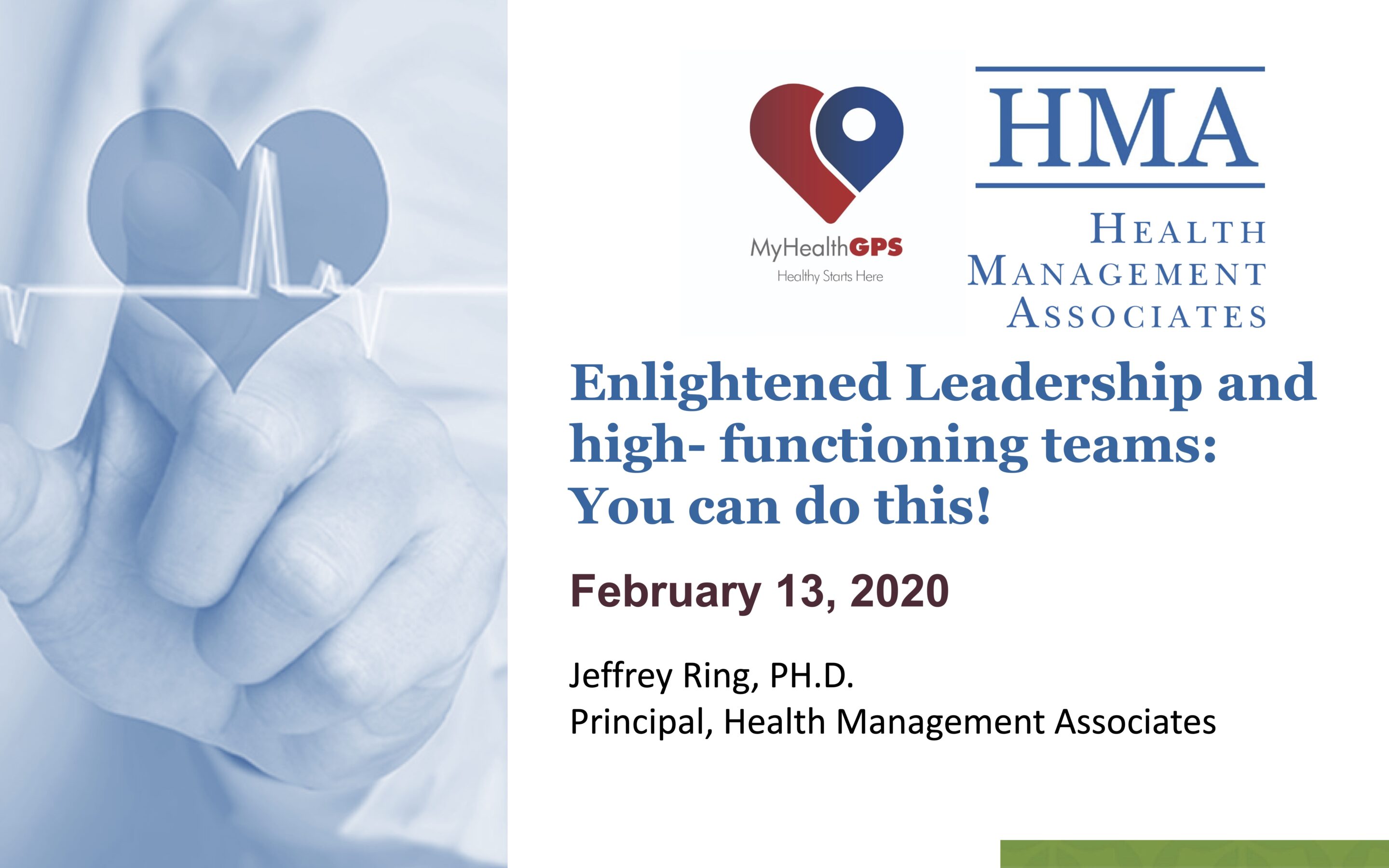
Enlightened Leadership & High Functioning Teams
An interactive exploration of the foundations of leadership and emotional intelligence, the importance of developing trust among team members, and strategies to channel conflict into a productive and necessary force for innovation.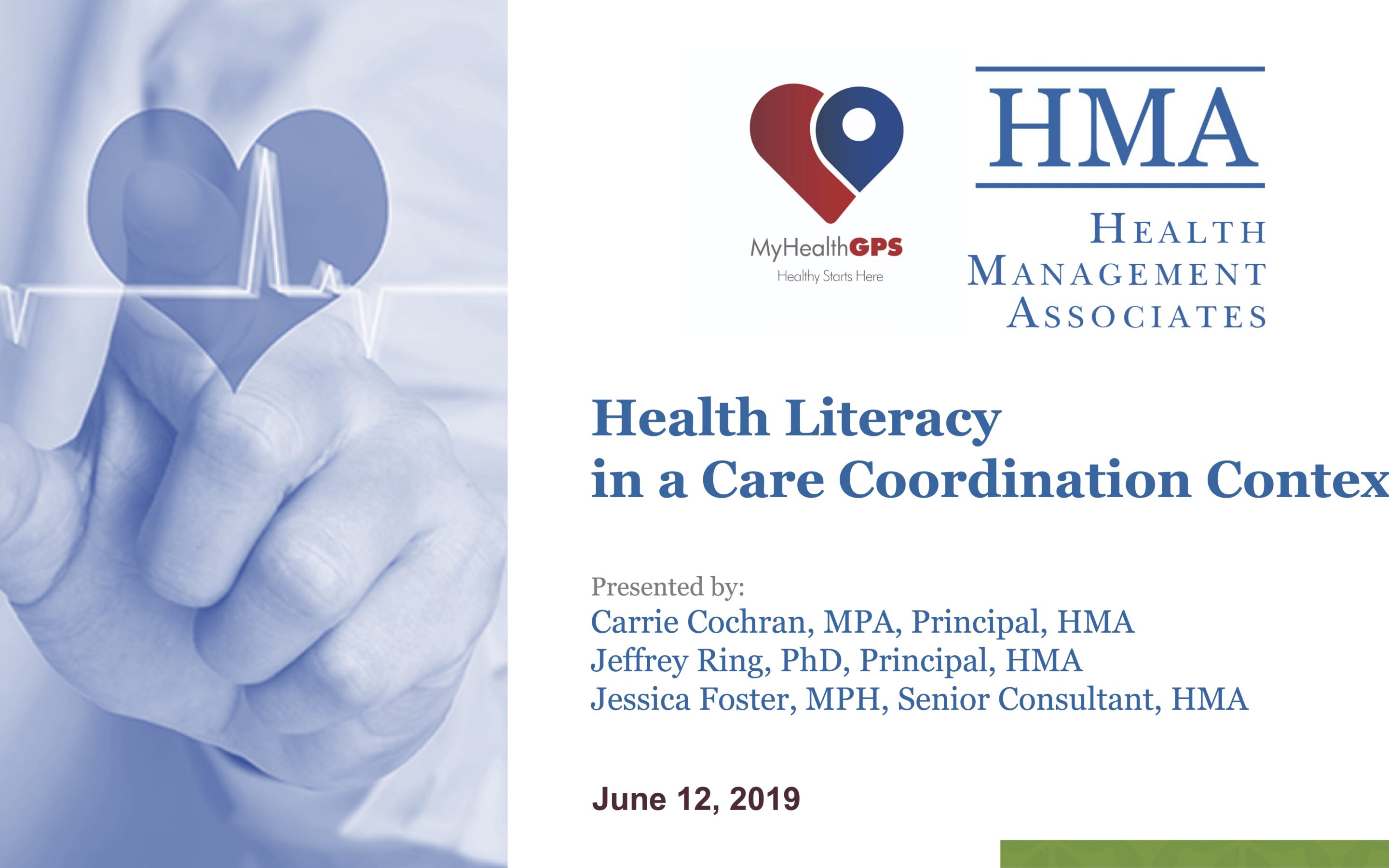
Health Literacy in a Care Coordination Context
An overview of health literacy, its impact on health outcomes, challenges facing patients, and health literacy resources and tips for communicating with patients.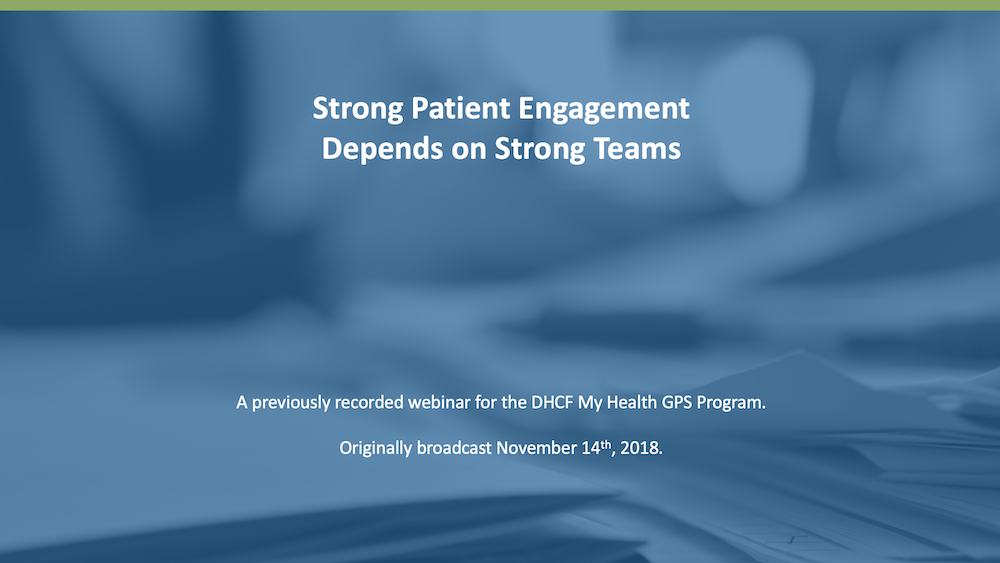
Strong Patient Engagement Depends on Strong Teams
This webinar includes a refresher on motivational Interviewing, presented tools to strengthen patient engagement and strategies for enhancing and maintaining clinician capacity to work with consistency, presence, and joy in the work.Stepped Behavioral Care in Primary Care
This webinar presented the Stepped Care Approach, including validated screening tools, strategies and resources for patients with mild, moderate or urgent behavioral health care needs.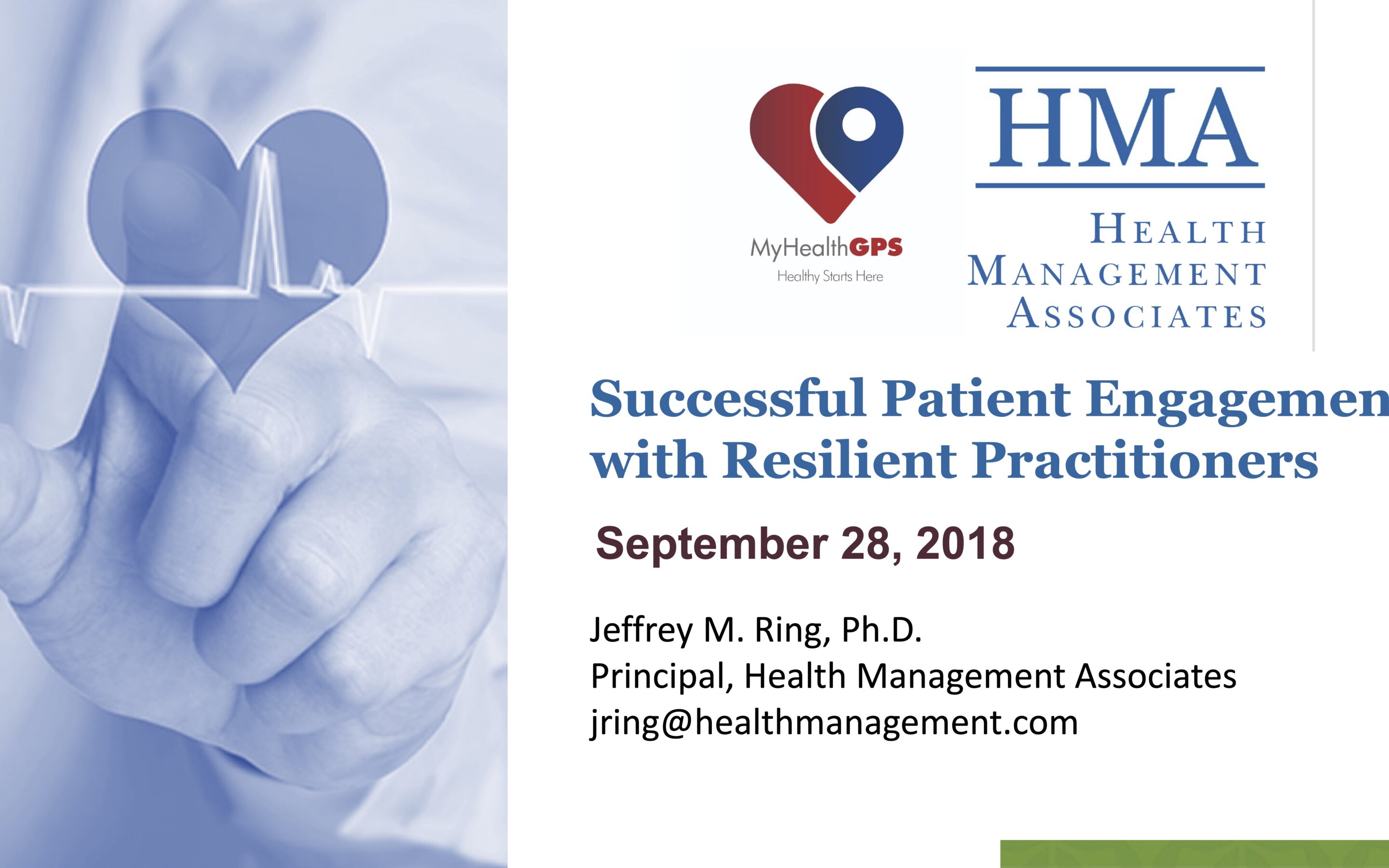
Successful Patient Engagement with Resilient Practitioners
During this webinar, Dr. Jeffrey Ring, clinical psychologist discussed strategies for effective member engagement and communications.